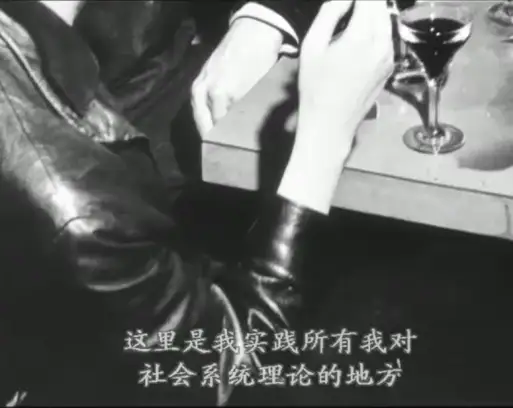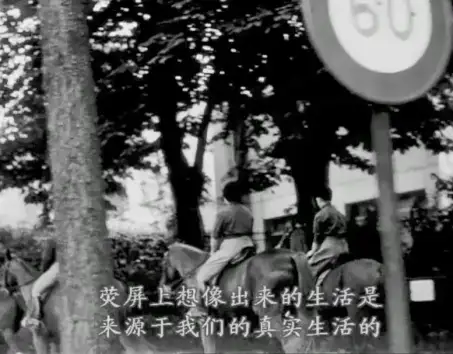关于在短时间内的某几个人的经过
影片信息
- 状态:HD中字
- 主演:/
- 导演:居伊·德波/
- 类型:短片/
- 年份:1959
- 地区:法国/
- 语言:法语
- 上映:未知
- 时长:19分钟
- 更新:2024-04-19 05:55
- 剧情:Voice 1 (male "professional announcer" type): This neighborhood(1) was made for the wretched dignity of the petty bourgeoisie, for respectable occupations and intellectual tourism. The sedentary population of the upper floors was sheltered from the influences of the street. This neighborhood has remained the same. It was the strange setting of our story, where a systematic questioning of all the diversions and works of a society, a total critique of its idea of happiness, was expressed in acts. These people also scorned "subjective profundity". They were interested in nothing but an adequate and concrete expression of themselves. Voice 2 (Debord, monotone): Human beings are not fully conscious of their real life - usually groping in the dark; overwhelmed by the consequences of their acts; at every moment groups and individuals find themselves confronted with results they have not wished. Voice 1: They said that oblivion was their ruling passion. They wanted to reinvent everything each day; to become the masters and possessors of their own lives. Just as one does not judge a man according to the conception he has of himself, one cannot judge such periods of transition according to their own consciousness; on the contrary, one must explain the consciousness through the contradictions of material life, through the conflict between social conditions and the forces of social production. The progress achieved in the domination of nature was not yet matched by a corresponding liberation of everyday life. Youth passed away among the various controls of resignation. Our camera has captured for you a few aspects of a provisional microsociety. The knowledge of empirical facts remains abstract and superficial as long as it is not concretized by its integration into the whole "” which alone permits the supersession of partial and abstract problems so as to arrive at their concrete essence, and implicitly at their meaning. This group was on the margins of the economy. It tended toward a role of pure consumption, and first of all the free consumption of its time. It thus found itself directly engaged in qualitative variations of everyday life but deprived of any means to intervene in them. The group ranged over a very small area. The same times brought them back to the same places. No one went to bed early. Discussion on the meaning of all this continued... Voice 2: "Our life is a journey "” In the winter and the night. "” We seek our passage..."� Voice 1: The abandoned literature nevertheless exerted a delaying action on new affective formulations. Voice 2: There was the fatigue and the cold of the morning in this much-traversed labyrinth, like an enigma that we had to resolve. It was a looking-glass reality through which we had to discover the potential richness of reality. On the bank of the river evening began once again; and caresses; and the importance of a world without importance. Just as the eyes have a blurred vision of many things and can see only one clearly, so the will can strive only incompletely toward diverse objects and can completely love only one at a time. Voice 3 (young girl): No one counted on the future. It would never be possible to be together later, or anywhere else. There would never be a greater freedom. Voice 1: The refusal of time and of growing old automatically limited encounters in this narrow, contingent zone, where what was lacking was felt as irreparable. The extreme precariousness of the means of getting by without working was at the root of this impatience which made excesses necessary and breaks definitive. Voice 2: One never really contests an organization of existence without contesting all of that organization's forms of language. Voice 1: When freedom is practiced in a closed circle, it fades into a dream, becomes a mere representation of itself. The ambiance of play is by nature unstable. At any moment "ordinary life"� can prevail once again. The geographical limitation of play is even more striking than its temporal limitation. Any game takes place within the contours of its spatial domain. Around the neighborhood, around its fleeting and threatened immobility, stretched a half-known city where people met only by chance, losing their way forever. The girls who found their way there, because they were legally under the control of their families until the age of eighteen, were often recaptured by the defenders of that detestable institution. They were generally confined under the guard of those creatures who among all the bad products of a bad society are the most ugly and repugnant: nuns. What usually makes documentaries so easy to understand is the arbitrary limitation of their subject matter. They describe the atomization of social functions and the isolation of their products. One can, in contrast, envisage the entire complexity of a moment which is not resolved into a work, a moment whose movement indissolubly contains facts and values and whose meaning does not yet appear. The subject matter of the documentary would then be this confused totality. Voice 2: The era had arrived at a level of knowledge and technical means that made possible, and increasingly necessary, a direct construction of all aspects of a liberated affective and practical existence. The appearance of these superior means of action, still unused because of the delays in the project of liquidating the commodity economy, had already condemned aesthetic activity, whose ambitions and powers were both outdated. The decay of art and of all the values of former mores had formed our sociological background. The ruling class's monopoly over the instruments we needed to control in order to realize the collective art of our time had excluded us from a cultural production officially devoted to illustrating and repeating the past. An art film on this generation can only be a film on its absence of real creations. Everyone unthinkingly followed the paths learned once and for all, to their work and their home, to their predictable future. For them duty had already become a habit, and habit a duty. They did not see the deficiency of their city. They thought the deficiency of their life was natural. We wanted to break out of this conditioning, in quest of another use of the urban landscape, in quest of new passions. The atmosphere of a few places gave us intimations of the future powers of an architecture it would be necessary to create to be the support and framework for less mediocre games. We could expect nothing of anything we had not ourselves altered. The urban environment proclaimed the orders and tastes of the ruling society just as violently as the newspapers. It is man who makes the unity of the world, but man has extended himself everywhere. People can see nothing around them that is not their own image; everything speaks to them of themselves. Their very landscape is alive. There were obstacles everywhere. There was a cohesion in the obstacles of all types. They maintained the coherent reign of poverty. Everything being connected, it was necessary to change everything by a unitary struggle, or nothing. It was necessary to link up with the masses, but we were surrounded by sleep. Voice 3: The dictatorship of the proletariat is a desperate struggle, bloody and bloodless, violent and peaceful, military and economic, educational and administrative, against the forces and traditions of the old world. Voice 1: In this country it is once again the men of order who have rebelled. They have reinforced their power. They have been able to aggravate the grotesqueness of the ruling conditions according to their will. They have embellished their system with the funereal ceremonies of the past. Voice 2: Years, like a single instant prolonged to this point, come to an end. Voice 1: What was directly lived reappears frozen in the distance, fit into the tastes and illusions of an era, carried away with it. Voice 2: The appearance of events that we have not made, that others have made against us, now obliges us to be aware of the passage of time, its results, the transformation of our own desires into events. What differentiates the past from the present is precisely its out-of-reach objectivity; there is no more should-be; being is so consumed that it has ceased to exist. The details are already lost in the dust of time. Who was afraid of life, afraid of the night, afraid of being taken, afraid of being kept? Voice 3: What should be abolished continues, and we continue to wear away with it. We are engulfed. We are separated. The years pass and we haven't changed anything. Voice 2: Once again morning in the same streets. Once again the fatigue of so many similarly passed nights. It is a walk that has lasted a long time. Voice 1: Really hard to drink more. Voice 2: Of course one might make a film of it. But even if such a film succeeds in being as fundamentally disconnected and unsatisfying as the reality it deals with, it will never be more than a re-creation "” poor and false like this botched traveling shot. Voice 3: There are now people who pride themselves on being authors of films, as others were authors of novels. They are even more backward than the novelists because they are unaware of the decomposition and exhaustion of individual expression in our time, ignorant of the end of the arts of passivity. They are praised for their sincerity since they dramatize, with more personal depth, the conventions of which their life consists. There is talk of the liberation of the cinema. But what does it matter to us if one more art is liberated through which Tom, Dick or Harry can joyously express their slavish sentiments? The only interesting venture is the liberation of everyday life, not only in the perspectives of history but for us and right away. This entails the withering away of alienated forms of communication. The cinema, too, has to be destroyed. Voice 2: In the final analysis, stars are created by the need we have for them, and not by their talent or lack of talent or even by the film industry or advertising. Miserable need, dismal, anonymous life that would like to expand itself to the dimensions of cinema life. The imaginary life on the screen is the product of this real need. The star is the projection of this need. The images of the advertisements during the intermissions are more suited than any others for evoking an intermission of life. To really describe this era it would no doubt be necessary to show many other things. But what would be the point? Better to grasp the totality of what has been done and what remains to be done than to add more ruins to the old world of the spectacle and of memories. 1. This film, which evokes the lettrist experiences at the origin of the situationist movement, opens with shots of the Paris district frequented by the lettrists in the early 1950s.《关于在短时间内的某几个人的经过》上映于1959年的电影,由居伊·德波执导,编剧 居伊·德波,这部电影豆瓣7.8分,
扫一扫用手机访问
为你推荐
换一换-
720P阿尔巴·布吕内,Raquel Ferri,贝茜·特内兹,Alejo Levis,佩普·安布罗斯,Sara Diego,Charlie Pee,Clara Altarriba,鲁姆·巴瑞拉,Daniel Lumbreras
-
720P内详
-
HD坦莫伊·达纳尼亚,Sahil Mehta
-
2.0HD1280高清中字版马东锡,金敏载,李圭成,朴智焕,李奎浩,李晟宇,차우진,李泰圭,이상용,아이락 김
-
3.0高清谭渤霖,于菲菲,张斯斯
-
高分推荐HD中字8.1 龚蓓苾,吴超,李易祥
-
HD中字大卫·马佐兹,莉莉·奇,Eli D Goss,Jolie Curtsinger
-
高分推荐HD9.3 Douglas Keay,Wilfrid Thomas
-
9.01080PAlexa Leigh Fletcher,Brooke Wallace
-
高分推荐1080P8.2
精彩评论
-

吃豆瓣的鲸鱼回复《关于在短时间内的某几个人的经过》:电影必须被销毁
2023-06-11 19:45:37原文地址:http://www.qh505.com/blog/post/4986.html
肥皂是白色的,裸体女孩是白色的,房间是白色的,所以电影也是白色的。这是纪录片的最后一个镜头。当女人触碰肥皂并暧昧地微笑时,她在表现什么,或者电影在表现什么?是生活的美好,欲望的纯粹,还是产品的诱惑?居伊·德波用这样的镜头展现的是一种虚幻的人生。这是一种产品消费的广告,而在可能的消费中,甚至连裸体的女孩也被一起消费。因此,镜头背后是一种“悲剧性的需要”,是一种“惨淡的、匿名的表达”,而这种解构是为了另一种建构,“与其给旧世界增添更多的图像和记忆,不如充分理解”已经做了什么,还有什么要做。”
最后一个肥皂广告,某种程度上来自于另一部电影的镜头。同样是女人,同样洗澡,却没有表现出肥皂的光滑和洁白。洗完澡后,女人的台词是:“我们分开了。岁月流逝,我们什么也没改变。”那么这是一部艺术片吗?当女人不再是产品的代言人,在分离的故事中,她离消费还远吗?而当时间的流逝、生活的变迁写在女人的眼中时,她不正是在这暂时的身心放松中“为旧世界增添了更多的场景和记忆”吗?她也不缺乏“全面审视已经做过的事情和尚未做的事情”的勇气吗?
广告呈现虚幻的生活,电影表达怀旧,但它们的共同特点是用明星来创造生活和情感,“明星就是这种需求的投射”。它只是一种投射,在居伊·德波看来,这种投射结束了真正的艺术,抹去了个体的深度,甚至将生活中蕴含的风俗戏剧化了。当明星成为我们的需求,当影像制造幻觉,电影只是表达了人们的奴性,情感甚至让人们成为了异化的交往方式中的商品,在与日常生活脱节的现实中,“但这又有什么意义呢?”
“电影也必须被销毁。”这是居伊·德波的宣言。当他开始转向情境主义时,他需要回答的是“什么应该废除”,就像电影台词说的“我们分开了”。这是1952年的巴黎,街上有车辆和行人。他们走得匆匆,在这座城市中寻找着自己的方向和位置。他们不是上流社会的居民,他们只是生活在能够容纳他们卑微尊严和体面职业的社区中。他们生活在哪里,却没有意识到自己的真实生活:“常常在黑暗中摸索;被自己行为的后果所淹没;团体和个人每时每刻都发现自己面临着绝望的后果。”在没有希望的生活中,会感到疲劳早晨寒冷,夜晚模糊孤独。”正如眼睛看不清很多东西,只能看清一件事,意志也只能残缺地移动。不同的人努力,也只能爱。一次完全是一个人。”看不清现实生活,所以第二天早上醒来,我再次走在街上,再次面对同样的疲惫和痛苦。心凉了,又入夜了。


如此循环,人生就像酒吧里喝醉的那一男一女,“实在是喝多了都难”。这是麻木的世界,这是失去激情的生活,这是缺乏自由的封闭现实。在居伊·德波看来,他们失去了“主观深度”,但悲剧并不在于他们依靠自己的意志摆脱这样的生活,却用虚幻来消耗时间、现实、激情,甚至自己。就像那块肥皂,看上去光滑,看上去洁白,看起来无限诱人,只不过是女人拿在手里的一个产品。
人也成为了产品。没有主观深度,他只能成为异化的客体,只能被社会所消费。他们说:“我们的人生是一场旅程。”但他们始终不想毁掉这段旅程;他们说:“我们寻求我们的护照……”但始终被囚禁在产品的现实之中;他们说:“没有人指望未来。”但他们自己抹去了未来。但不仅仅是他们自己,这个社区、这个城市、这个社会也带入了现实的消费,创造了虚幻的生活。这就是居伊·德波所说的“系统”:“所有的娱乐和活动都由系统性的质疑来控制。”于是所谓的幸福观受到了全面批判,并用实际行动鄙视了这些人的“主观深度”:允许他们玩,但游戏的地域限制比时间限制更显着,“任何人都可以玩”。游戏都在其空间域的轮廓内进行,在其附近,在其短暂的、危险的静止周围,延伸着一座半知半解的城市,人们只是偶然相遇,然后永远迷失。”她们失去了自由,在一个封闭的圈子里实行,18岁就被监禁的女孩,在受到家庭合法性的控制之前,“常常被这个可恶机构的捍卫者重新抓获。“他们只是生活在‘最令人厌恶的动物保护者背后’;他们处于经济的边缘,他们被政治遗忘,他们被技术控制......所有这些都使他们成为被消费的人。”,所以这个时代就变成了居伊·德波所说的“混沌整体”。
这就是他所批判的景观社会。个人只不过是社会的镜像,是“社会功能原子化”、产品消费下沉的受害者,“艺术的衰落和旧道德价值观的形成构成了我们社会学的背景”。当他们用商品经济的概念来谴责审美活动时,当他们用野心和权力来孤立日常生活时,当他们取消个体自由和主观深刻性时,其实他们就是统治阶级。所以从镜头下的“微社区”来看,需要的是突破、解放,甚至是革命。
不过,居伊·德波并不要求以个人的方式激发政治热情,“经验事实的知识,只要不是融入整体具体化,即只允许局部和抽象问题的叠加”,从而得出他们的“它仍然是抽象和肤浅的”。在他看来,首先要通过矛盾来看待景观社会的问题,“就像一个人不能根据自己的想法来判断一个社会一样。就像人一样,一个人不能从自己的想法来判断这个转型的时期。”意识;相反,我们必须通过物质生活的矛盾,通过社会环境的冲突来解释这种意识。”并在此基础上,以整体来对抗总体性,去除经验主义,去除个人主义,“人是创造世界统一的人,但人将自己延伸到世界的各个部分。人们在周围什么也看不到,不是他们自己的形象;一切都是他们自己的。他们的风景是生动的。”
那张照片里的人是静态的、二维的,但相机让他们活了过来。他们在酒吧里,喝酒抽烟,讨论话题,即使眼神有些模糊,他们却还在。将是一种解构性和革命性的力量,因为一切都必须结束,因为一切都必须开始,“无产阶级专政是一场殊死的斗争,流血的、不流血的、暴力的、和平的、军事的、经济的、教育的和行政的,反对各种势力和传统。旧世界的。”他们游行,他们示威,他们在街头战斗,他们团结起来,“在这个国家,叛逆的又是有秩序的人。他们加强了自己的权力……”“这不是现实吗?这不是日常生活吗?”谁害怕生命,害怕黑夜,害怕被夺走,害怕被保存?“
某些人在短时间内的经过,其实是一种意识,一种行动,一种从小人群开始的浪潮,而在这不是电影而是纪录片的画面中,人们常去的酒吧那些作家成为了一场革命的中心,他们在那里发起了情境主义运动,而这场运动就是要与曾经的现实“分离”,要摧毁景观社会,要废除混乱的总体性,要消灭虚幻的生活,要打碎消费产品,“电影也必须被摧毁”。-“唯一有趣的冒险就是解放日常生活,不仅从历史的角度来看,而且从我们和现在的角度来看。”
时间是日常生活的时间,自由是日常生活的自由,艺术是日常生活的艺术,革命当然是日常生活的革命,纪录片是日常生活的影像记录,它是不是电影,不是产品,不是为了消费:某些人在短时间内的流逝,构成了一幅生动的画面,没有肥皂剧,没有明星,没有幻想,因为这正是“已做过的,仍待完成”。做完了。”